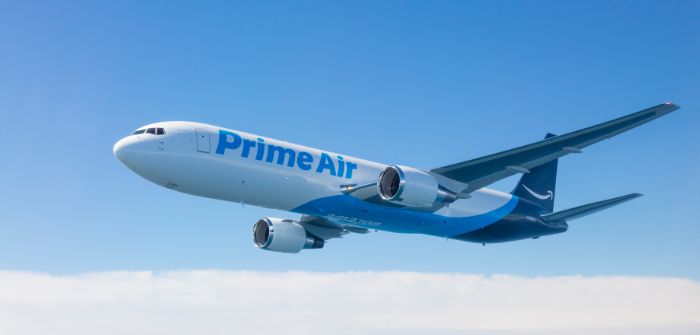Amazon’s growing aircraft fleet could grow to 200 by 2028 as it expands its North American network this decade.
The study, Insights into Amazon Air 2020’s Transportation Juggernaut, was written by Joseph Schwieterman and Jacob Walls at the Chaddick Institute for Metropolitan Development at DePaul University, Chicago, Illinois.
Calling Amazon Air’s growth “one of the most significant developments in the US air-cargo business in years”, the authors say the online retail giant’s aircraft fleet is likely to reach 70 by next year and hit 200 within seven to eight years.
Amazon Air started flying in 2016 using Boeing 767-300 Freighters operated by Atlas Air and has become a major component of Amazon’s overnight and two-day delivery business.
It operates almost 100 flights a day in North America, primarily operating from airports focusing on cargo with fewer passenger services.
Amazon Air has built large sorting facilities at airports including Chicago Rockford, Illinois; Ontario, California; Tampa, Florida; and Wilmington, Ohio. These are often near FedEx and UPS sorting centers so if Amazon cannot use its own fleet, packages can be given to integrators or USPS.
With 42 aircraft, the report says Amazon Air is a mid-size cargo carrier, but if it achieves its goal of 70 by 2021, it will be almost as large as DHL.
Amazon has stated it wants to operate 100 own-brand aircraft at its Cincinnati/Northern Kentucky International Airport hub alone, where it is investing US$1.5bn in a mega hub due to open next year.
The report says it is reasonable to assume Amazon Air’s fleet could grow to 200 aircraft in seven to eight years; it has grown rapidly and shows no sign of slowing down.
Other observations from the report are that Amazon’s growth is bringing it into conflict with existing integrators including FedEx and UPS, the former stopping handling some of Amazon’s traffic last year due to financial reasons.
Research from the Bank of America stated, “Amazon is approaching a truly vertically integrated logistics network on par with the largest delivery companies in the world.” The report added that Amazon’s network is less well-developed than FedEx or UPS.
The report concludes that it is noteworthy how Amazon has ambitious growth plans while most other airlines are reducing their fleets.


